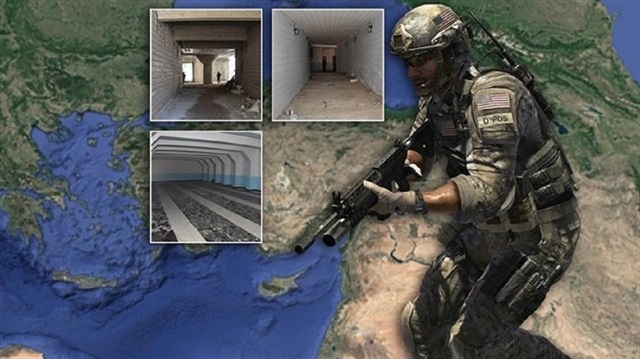

File photo
Specialists deem that the fact that these tunnels not only weren’t destroyed, but expanded after the failed July 15 coup attempt, goes to show that their ploys in the region are still ongoing
Intricate networks of tunnels and underground bases uncovered across Syria’s Afrin during Turkey’s Operation Olive Branch are said to be part of the plans to target the country during the failed July 15 coup attempt, according to military specialists.
A huge underground terrorist base has been found in Syria’s Afrin region, which was recently liberated during the Turkey-led operation.
The base could host around 1,000 people and was discovered when the Turkish military and Free Syrian Army (FSA) were clearing the area.
"Were these tunnels going to be used if the July 15 coup attempt succeeded?”
Military specialists emphasize that these tunnels carry more importance than being merely built to assist PKK/PYD terrorists.
“If the coup attempt had succeeded thousands of terrorists would reach Anatolia and assume great roles in the division of our country. There are several tunnels similar to those that have been uncovered in Afrin along the border with Turkey. That’s why the question of whether soldiers and munitions deployed to these tunnels were going to be unleashed against Turkey if the July 15 coup attempt was successful is important.”
A total of 249 people were martyred and nearly 2,200 injured in the July 15 failed coup which was perpetrated by Fetullah Terrorist Organization (FETÖ), led by ringleader Fetullah Gülen, who lives in self-imposed exile in Pennsylvania.

Large enough to hide artillery batteries
It is said that the tunnels that were uncovered were so wide and well-designed that they can easily house military vehicles and thousands of soldiers.
The 10-meter deep underground quarters is situated in a forested area located in the mountains surrounding Afrin.
The base had been built using special heavy equipment; it could barely be detected by drones due to the coverage of trees.
The quarters have around 100-120-meter-long corridors. At the end of the corridors, there are dozens of conference halls, rooms, bathrooms, toilets and emergency exits.
Additionally, these tunnels serve a critical purpose in terms of controlling 175 millimeter artillery due to the fact that a control system could be set up underground, enabling them to control these weapons while avoiding being spotted by enemies or drones. A similar tactic was employed by NATO during the Bosnian War.
"The biggest target in the region is currently Turkey"
Even though the July 15 coup attempt and Operation Olive Branch foiled this project, turkey continues to be the biggest target in the region.
Specialists deem that the fact that these tunnels not only weren’t destroyed, but expanded after the failed July 15 coup attempt, goes to show that their ploys in the region are still ongoing.
“The West has no use for these tunnels in Syria, which has been destroyed in the eight-year-old war. Western forces are setting up these tunnels because Turkey is currently the biggest target in the region. This is the reason why Operation Olive Branch is more than just a military campaign, it is regarded as a move that changed the fate of the region.”
Turkey launched Operation Olive Branch on Jan. 20 to clear YPG/PKK and Daesh terrorist groups from Afrin in northwestern Syria amid growing threats from the region.
On March 18, Turkish-backed troops liberated Afrin town center, which had been a major hideout for the YPG/PKK since 2012.
According to the Turkish General Staff, the operation aims to establish security and stability along Turkey’s borders and the region as well as to protect Syrians from the oppression and cruelty of terrorists.
#Tunnel
#Afrin
#PKK
#FETÖ
#Coup
#Turkey
#NATO


